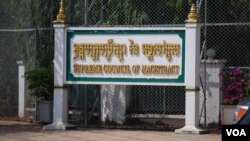Three draft judicial reform bills are expected to be reviewed by the Council of Ministers for approval in coming weeks, but legal experts say they hope the drafts will not be corrupted by politics.
The draft laws affect the structure of Cambodia’s court system, as well as the oversight role of the Supreme Council of Magistracy and the roles and duties of judges and prosecutors.
Experts say the hope is that the new laws will strengthen oversight over the courts and create a judicial system that people trust. Currently, the Cambodian courts are widely seen as corrupt and politically biased.
“First, the court should be independent,” said Run Saray, executive director for Legal Aid of Cambodia. “Meaning, it must not be under political or other influences. Second, the most important, is that is will be useless to enact reform without enforcing the law.”
That means pitting the rule of law against violence, revenge, murder—and myriad crimes that go unpunished, eroding people’s faith in the courts, he said.
“When people have problems, they come to the court for a solution,” he said. “But when they come, the court doesn’t solve them, so that have to find their own means to solve them.”
In properly democratic countries, the participation of civil society, the opposition and citizens helps make laws the reflect the will of everyone, not just one group or individual, he added.
In Cambodia, most members of the Supreme Council of Magistracy, as well as nearly every judge and prosecutor, are supporters of the ruling Cambodian People’s Party. Critics say this makes it difficult for the country to reform the judiciary into an independent body.
Son Soubert, a former member of the Constitutional Council, told VOA Khmer the judiciary should be separated from the executive and legislative branches, according to Cambodia’s constitution. “It’s not like that, because the court is under the executive branch and the legislative branch as well—which in English we call a ‘rubber stamp,’” he said. “This has no honor. How can we say Cambodia is a democratic country?”
The judiciary can be a powerful balance against the powers of the executive or legislative branch, he said. And these days, calls for reform are growing.
Ny Chakrya, head of legal aid for the rights group Adhoc, said the separation of the judiciary can ensure equal justice for all. “The court plays a vital role in democratic countries and nations of law,” he said.
It’s also important politically to have an independent judiciary, to arbitrate political disputes—such as those in Thailand—he said. Strong courts enable law enforcement, which can protect legal demonstrations, for example, he said.
In Cambodia, however, the courts are “under” the politicians, he said. And if the draft laws don’t have input from outside experts and members of the community, it will be hard to trust the reform, he said. “If the laws come under the power of the politicians who have controlled the courts in the past, nothing is going to change at all,” he said.
Keut Sekano, a senior official in charge of judicial reform at the Ministry of Justice, expressed optimism over the new round of efforts and the new draft laws.
For example, the draft law dictating the Supreme Council of Magistracy will clearly define the roles of council members, he said. The council, led by the chief of the Supreme Court, the Supreme Courts lead prosecutor and the Minister of Justice, will review judges and prosecutors. And the chief of the Supreme Court will hold a position as disciplinarian over judges, with the court’s chief prosecutor doing the same for all other prosecutors, he said.
“We hope that it will help reform even more when the laws are passed,” he said
Still, outside observers say the public should have more roles to play.
Kao Supha, a lawyer in Cambodia, told VOA Khmer that more members of independent sectors should be incorporated into the Supreme Council of Magistracy, with changes made to the topmost four members of the Supreme and Appeals courts. Judges and prosecutors should be retired at the proper age without exception, and they should be rotated every four years from one court to another, to avoid conflicts of interest, he said.
All three laws are now moving through the system. Prime Minister Hun Sen ordered them to be completed and sent before the National Assembly for debate by the first quarter of this year.
Legal Experts Wait as Judicial Reform Bills Move Forward
- Sok Khemara
- VOA Khmer

WASHINGTON DC —






